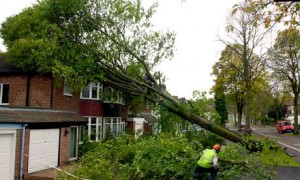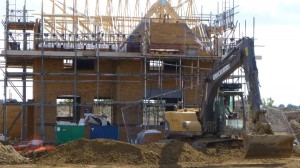Winds strong enough to cause damage to property are fairly rare in the UK. When a severe weather warning is issued in your area it is a good idea to take some sensible precautions to protect your home and property.
Autumn precautions and maintenance measures to take:
- Check your fences. Most home insurance policies specifically exclude storm damage to fences. So before the autumn weather sets in replace and loose or rotted fence posts, repair panels and replace rotten gravel boards. Ensure all panels are securely fixed to fence posts. It is a good idea to add screw the battens on fence panels as this makes them stronger and prolongs the panel life.
- Make sure that your guttering, drainpipes and overflow pipes clear of debris and leaves and check they are securely attached to the building.
- Regularly inspect your roof for damage, loose or missing tiles and broken or missing pointing and any dislodged lead flashing. Even if it appears minor, ignoring small items like a missing tile may provide a weakness meaning any storm damage is likely to be much more extensive if it is not attended to beforehand.
 Inspect any trees on your own and neighbouring properties. Cut off any branches and dead areas, likely to be dislodged by a storm. Cut down any dead trees. However do not touch and trees that are protected under a tree preservation order but write to the council and ask permission to get a tree surgeon to do the work.
Inspect any trees on your own and neighbouring properties. Cut off any branches and dead areas, likely to be dislodged by a storm. Cut down any dead trees. However do not touch and trees that are protected under a tree preservation order but write to the council and ask permission to get a tree surgeon to do the work.- It is best if the TV aerial is located inside your roof space. If it is not consider this but as a minimum ensure it is securely fixed so that it doesn’t come loose in high winds. Also be sure to check that what it is fixed to is also secure!














